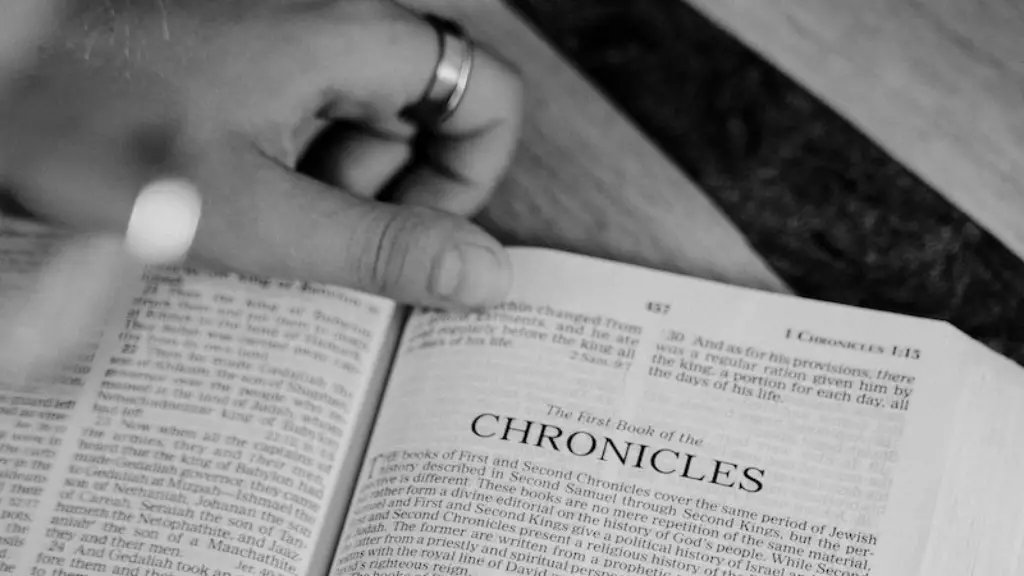Marriage
Marriage is an institution that has been around since the beginning of time. It is based on a long-standing commitment between two individuals who love and care for one another and want to share their lives together. A traditional marriage is usually sealed with a vow exchange, as a symbolic promise that, no matter what life brings, both parties will hold true to the commitment of marriage.
Since its inception, marriage has undergone many changes and has been shaped by the culture, society and even religious beliefs of the times. One of the oldest and most widely accepted sources of marriage vows is the Bible.
Are Marriage Vows In The Bible?
The answer is yes, there are marriage vows in the Bible. The first mention of marriage is found in Genesis 2:24 when God said, “For this reason a man will leave his father and mother and be united to his wife, and they will become one flesh.” This is often cited as the foundation for marriage vows.
In the Old Testament, there are several examples of marriage vows throughout scripture, such as Deuteronomy 24:5, Ruth 1:17, and Ecclesiastes 4:9-12. However, these are not necessarily direct marriage vows as much as interpreted general truths about marriages. In the New Testament, the most prominent reference to marriage vows comes from the Book of Mark 10:7-9.
In these verses, Jesus talks about the relationship between a husband and wife and how they should stay together. This passage is often quoted in weddings and is used as the foundation upon which couples pledge their commitment of marriage to one another.
The Meaning Of Marriage Vows In The Bible
The Bible teaches that marriage is meant to be a lifelong commitment. The purpose of marriage of marriage vows is to express that commitment to one another, and to God. As Christians, we are taught to strive to live a life that honors God, and marriage is no exception.
Vows are a way for couples to exchange words that express their love, loyalty and devotion to each other, and to God. In the Bible, marriage is seen as a reflection of God’s love for His people. Asking a higher power to witness and sanctify their vows reinforces its importance and symbolizes the couple’s commitment to each other and to God.
The Bible does not provide specific vows, or a “right” way in which to recite them. Couples are encouraged to write their own vows, or use another source, such as traditional vows or other custom vows, that reflects their values and beliefs.
Changing Nature Of Marriage Vows
Today, marriage vows have taken on a more modern form. They often include statements such as “in sickness and in health” and “for better or for worse”, which reflect a more realistic view of the trials and joys of marriage. These sentiments are similar to those found in the Bible, as they emphasize the strength of commitment, loyalty and dedication in a relationship.
Some couples opt for non-traditional vows, such as those taken from popular culture or original works of their own. Although this is not a biblical concept, it does not make the vows any less significant or meaningful. These discoveries sometimes represent a couple’s sense of humour and sentimentality, and make the exchange of vows a more personal and intimate experience.
Impact of Marriage Vows
A marriage vow is more than just words, it is a lifelong commitment. It is a promise to remain faithful, loving and supportive. Vows help to strengthen marriages by acting as a reminder of the responsibilities and expectations of both parties.
Marriage vows serve to reinforce the strength of a relationship and the importance of commitment. It holds the couple accountable to each other, and to God. As society and the world around us evolve, couples may choose to change or modify their vows, while still abiding by the underlying message.
Different Perspectives On Marriage Vows
Different people have different opinions on marriage and the importance of the marriage vow. For some people, marriage is seen as a way to make a formal, public commitment to their partner and to follow the biblical tradition. For others, marriage is a sign of love and commitment, something that needs no public declaration.
The exchange of marriage vows also may have different implications based on one’s faith. To Christians, a traditional wedding is seen as a symbolic gesture of obedience and surrender to God’s plan for their lives. Other faiths have their own unique ceremonies and rituals, which may or may not include vows.
Difference in Customizing Marriage Vows
Customizing marriage vows can be a way for couples to add their own flavor to the traditional marriage vow. Despite the different levels of customization, marriage vows should always contain the major points of loyalty, commitment and trust, as well as an acknowledgement of God as the ultimate witness.
Couples can customize their vows to reflect their own personalities, backgrounds, and values. This allows for couples to make their own statement about what their marriage means to them, and how they intend to uphold the promises they make to each other.
Changing Trends In Marriage Vows
In recent years, we have seen a shift in the trend of marriage vows. Couples are opting for more creative and meaningful vow exchanges, where they share stories of their journey together, share unique gifts, or write their own vows.
This trend is often seen as a response to the changing attitudes around marriage. As more couples choose to tie the knot in different ways, it is natural that the wedding ceremony and marriage vows should also evolve.
Varied Opinion On Marriage Vows
At the end of the day, marriage vows are a personal choice, and there is no one-size-fits-all approach. The most important thing is that couples begin their journey as husband and wife on a solid foundation of love, commitment and faith.
For couples who choose to include marriage vows in their wedding ceremony, the Bible will always remain a source of inspiration, guidance and support.





